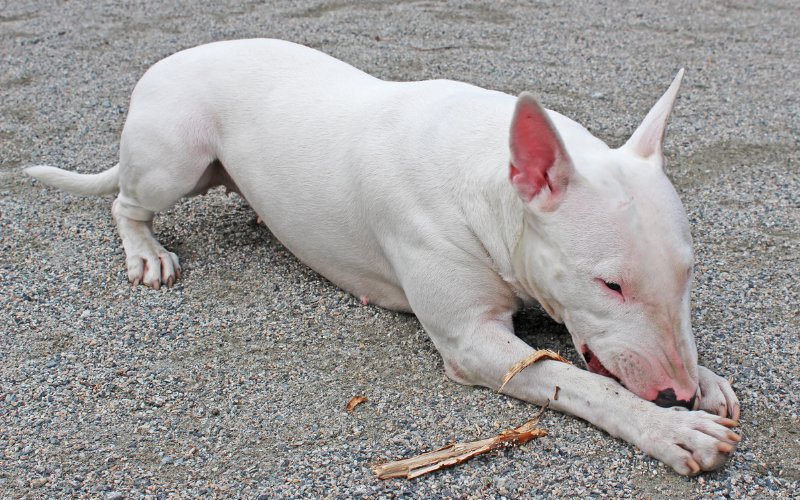
OCD In Bull Terriers
|
Time to read 4 min
|
Time to read 4 min
©MG-54 via Canva.com
You may have heard of obsessive compulsive disorder, but did you know Bull Terriers can have forms of this disorder too?
Obsessive compulsive disorder in Bull Terriers is characterized by a repetitious, relatively unchanging sequence of movements or activities that has seemingly no obvious function or purpose.
These are generally abnormal, repetitive, and exaggerated behaviors, usually derived from normal maintenance behaviors like excessive grooming, eating, and walking. This repetitive behavior in Bull Terriers interferes with their normal behavioral functioning.
As with other canine anxiety disorders in Bull Terriers, the onset of OCD begins early, around 12 to 24 months of age, as the Bull Terrier developmentally matures. If you are observing early signs of obsessive behavior in your Bull Terrier, and it's descended from a line where other Bull Terriers are affected, early intervention is critical.
The most commonly observed obsessive-compulsive behaviors in Bull Terriers are:
OCD may be seen in young Bull Terriers, but onset is more common during social maturity and it increases with age. Here are some possible symptoms of obsessive compulsive disorder in Bull Terriers:
Some Bull Terriers also show the potential for aggression
The Bull Terrier’s behavior intensifies over time and cannot be interrupted even with physical restraint, increases in frequency or duration, and interferes with normal functioning
Research into the causes of obsessive-compulsive behaviors in Bull Terriers is ongoing. Here are some possible causes of obsessive-compulsive disorder in Bull Terriers:
Our canine companions can't tell us what they’re obsessing about. So obsessive-compulsive behaviors in Bull Terriers can be very hard to diagnose. Is your Bull Terrier just energetic or is it something more? In fact, it’s not so much what they do, but the way that they do it.
When you bring your Bull Terrier into the vet for behaviors related to OCD, the initial focus is on ruling out other medical causes. Your vet will perform a complete physical exam on your Bull Terrier.
You will need to give a thorough history of your Bull Terrier's health, including a background history of symptoms, any information you have about your Bull Terrier's lineage, and possible incidents that might have triggered the behavior. Your vet will order a complete blood profile, imaging assessments, an electrolyte panel, and a urinalysis to rule out any underlying physical problems.
Diagnosis by a vet and intervention is critical, as soon as possible. Common treatment options for OCD in Bull Terriers include:
Scolding or punishing the behavior is counterproductive with obsessive-compulsive disorder as the behavior itself is often triggered by stress.
Some cases of obsessive compulsive behaviors in Bull Terriers are severe and require medication to calm the compulsive urges and to significantly improve the quality of life. Your vet may prescribe anti-anxiety medication along with a behavior modification program. Behavior modification will be geared toward teaching the dog to relax in a variety of environmental settings. Also, the Bull Terrier’s environment may need to be altered.
Medications and behavior modification may take several weeks to months to show an effect on the target behavior. Setting realistic expectations for change will help you manage the outcome of behavioral and medical interventions. Keep in mind that relapses are common in such cases. If medication is prescribed, it is important to follow your vet’s instructions and give Bull Terriers the entire course of medicines.
Don’t try to reassure your Bull Terrier that they don't have to spin, chew, or perform other repetitive behaviors. Reward the Bull Terrier only when they're not engaged in behavior and are relaxed. However, the behavior should not be entirely ignored. If left untreated, obsessive-compulsive behaviors in Bull Terriers almost always progress to more serious levels and can have unpleasant consequences.
If your Bull Terrier suffers from OCD, be sure to stay in touch with your vet about your Bull Terrier's progress. Do not change or stop medications without discussing it with your vet first. Know that treatment protocols may need to be periodically adjusted. Be sure to let your vet know right away if there is a change in your Bull Terrier's behavior.
Just as humans can experience obsessive-compulsive behaviors, Bull Terriers too can exhibit forms of this disorder. Recognizing the signs and understanding their complex nature is crucial. Early intervention, guided by a veterinarian, is essential for effective management. Providing a structured routine, positive reinforcement, mental stimulation, and potentially medication can help alleviate the distress caused by OCD in Bull Terriers. By focusing on their well-being, patience, and tailored care, you can support your Bull Terrier in overcoming these challenges and leading a happier, more balanced life.